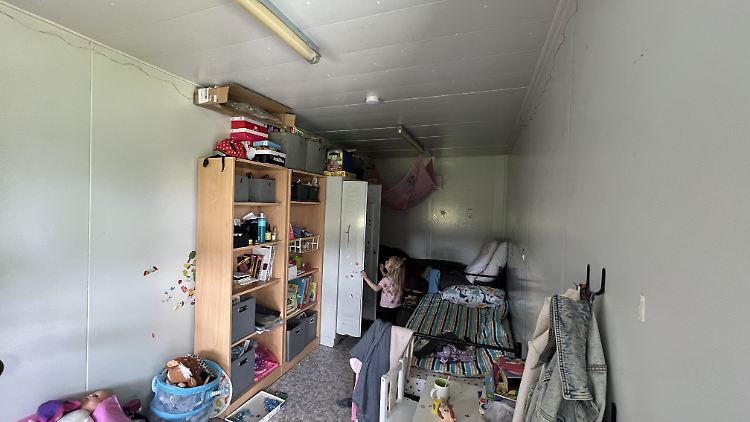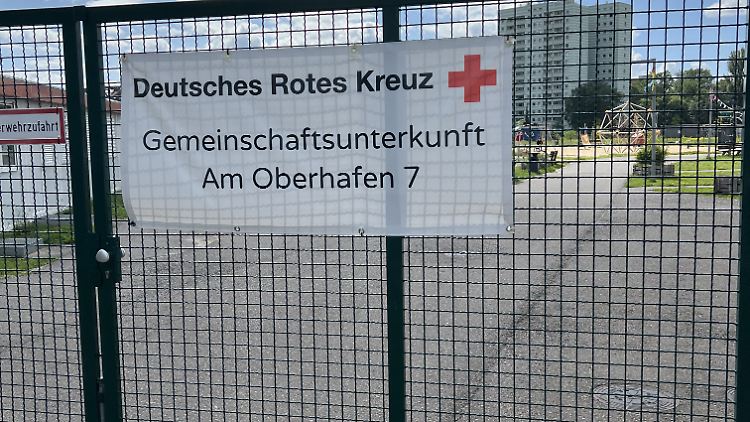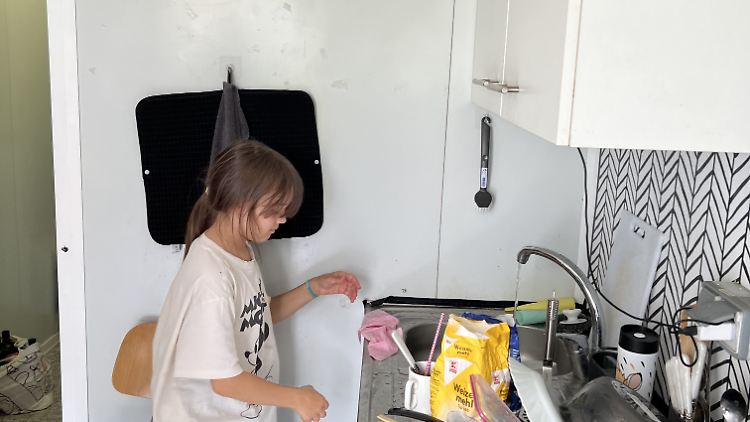Many refugees from Ukraine have already found their own apartment in Germany, but there are still some who live in containers. In Spandau, on the outskirts of Berlin, a Ukrainian woman feels like she is in a daily battle for survival.
The strongest contrast to the dazzling city is not the gray container that serves as Masha and her daughters’ home, but rather her own story. A story of escape, resilience and hope. The three have been living in Spandau, a district on the western edge of Berlin, for more than a year.
At the entrance to the container warehouse there is a sign, “German Red Cross, Community Accommodation Am Oberhafen”, and a guarded checkpoint. “We have a very reliable security service here,” says Masha. To get in, you have to hand over your ID and receive a plastic card in return.
We go through the checkpoint to Masha’s apartment number 10.8. There are dozens of white and gray containers all around. There is a playground in the middle where children play. There isn’t much space between the containers themselves, there are a lot of people of different nationalities traveling here. Masha is happy that she and her daughters got a whole container with two rooms. Your mother-in-law has to live with strangers in a room. There aren’t many Ukrainians here: Masha and her children, her husband’s mother, two other families. Other residents come from Moldova, Syria and other countries. “In general, these containers were intended to last for three years when migrants came here from other countries. Now they are already six years old,” says Masha.
When we enter the container, the older daughter is washing dishes and the younger daughter is watching a cartoon with princesses. “We didn’t clean up,” apologizes Masha. Your container consists of two rooms, a shower, a toilet and a kitchen.
Masha is 34 years old, has long, dark blonde hair and wears glasses. She is a psychologist by profession. Before the great Russian invasion of Ukraine, she worked in a primary school in Bucha near Kiev and lived in Irpin – two cities that are now internationally known as scenes of Russian war crimes. She started learning German in Germany. She has already taken the exam for language level B1 and is currently waiting for the result. She has a lot of time for her children, but sometimes she works online as a psychologist at night. “I can’t stop working because this is my resource. I still have clients. Mainly I work with refugees because I have been interested in this since 2016, when I worked as a psychologist with people from Luhansk and Donetsk. Yesterday I had a psychological session with a client who lives in America at 12 o’clock at night because of the time difference,” says Masha.
“We lived there”
Otherwise, you find your life in Berlin monotonous and burdened by German bureaucracy. She left her hometown on February 25, 2022: She fled to western Ukraine with her children, her husband and her mother-in-law. “As we drove off from Irpin, Russian vehicles came towards us. But we were able to pass them,” says Masha. They later found out from the news and from friends that their apartment had been destroyed. A shell hit the second floor of the house, on the ground floor of which was the family’s apartment. The house was demolished in the spring because it was no longer habitable. “By Video by Kalush for the song with which they won the Eurovision Song Contest in 2022“Where the destroyed buildings are – that’s our part of Irpin, that’s where we lived,” says the woman.
Shortly after arriving in western Ukraine, the family decided that they would travel on to Germany. However, after a while the man went back to Ukraine. “He doesn’t want to live in Germany, although he has the opportunity to stay here.” Masha’s husband’s mother has a disability. For this reason, he was allowed to accompany her abroad and care for her there.
In Berlin, Masha and the children temporarily lived with a friend. But after a while it got a bit tight there. “My friend took all the refugees into her home. She had a two-room apartment. In some cases there were several families there, 15 people.”

The younger daughter, Esfir, is thinking about what she should wear for a walk today.
(Photo: Maryna Bratchyk)
Masha’s younger daughter, Esfir, will soon be 4 years old and is attending kindergarten. The family waited for this for more than a year. “Sometimes I read fairy tales to her in German and she likes it, she says she understands it,” smiles her mother. The eldest daughter, Virsaviia, is 9, she will go to a German school in September, but they don’t know yet which class she will attend. So far she has been in a welcoming class. In Ukraine she had almost completed the second grade. “I have the feeling that she has become stupider during this time,” says the mother. “There were only foreigners in the welcome class, so she hardly learned the German language because she didn’t communicate with native speakers and didn’t make any new friends.” Masha wants her daughter to learn the language and attend school here, at least until the end of the war. “Now I don’t want to go back to Ukraine, I don’t know what to do there. Should I rent the same container or an apartment there?”
And then there was the divorce
Suddenly Masha says: “My husband and I are getting divorced.” This shocking sentence hangs in the room for a while. “Before the big invasion, we were just breathing free from the corona crisis,” explains the woman. “Our family was having some financial difficulties. We had our second child, which wasn’t easy. We had just bought the apartment just before the invasion. And my husband was wondering how much the renovations would cost…”
Masha is convinced that her marriage did not fail because of the war, but had already broken down beforehand due to various problems and stresses – financial difficulties and the stress with the baby, of all things during the Corona crisis. The little one also slept poorly and didn’t want to eat. “After we bought the apartment, we were a little out of breath. The war just came at a time for us when we no longer had the strength or resources to work on anything. We both just wanted support, but we “We couldn’t give it to each other because we had so many demands and expectations on each other that weren’t met,” says the psychologist, summing up the disintegration of her own marriage.
As a refugee in Germany, Masha not only goes through the difficult process of integration, but also faces the everyday grind of German bureaucracy. “The paperwork here is very stressful,” she says. “The Germans are trying to digitize everything, but they’re not very good at it yet. And for me it’s hard to understand how everything works.” She says that she was once so desperate while going to the authorities that she “freaked out”. “I showed them our Dija app,” she says – the application with which Ukrainians can use almost all government services. “They were speechless when they saw that I had my ID and all my documents on my smartphone,” she says. She laughs as she describes her interactions with the German bureaucracy, but also conveys her irritation – such a high level of technology seems beyond the imagination of German officials.
Masha has no long-term plans. But in September she wants to go to Lodz, Poland, because an accordionist she likes is performing there. “And I have a party on a boat with my girlfriend soon. I want to dress up, put on makeup and show off.” Masha still hopes that she won’t have to spend the next winter in the container. But she has been looking for an apartment for a long time in vain. When Masha came into the container for the first time, she told her husband on the phone that she was about to drown herself in the river next to the camp – the Havel flows directly past the camp. She was annoyed about everything. “I was annoyed that our toys were stolen, that people were constantly running back and forth, that some people were drunk in the morning, that there were just people who didn’t need anything in life.” But then she changed her perspective: “I couldn’t understand how people could live in these containers for years, and now I’m in this situation myself. I like this area now, I like looking at the water.”

